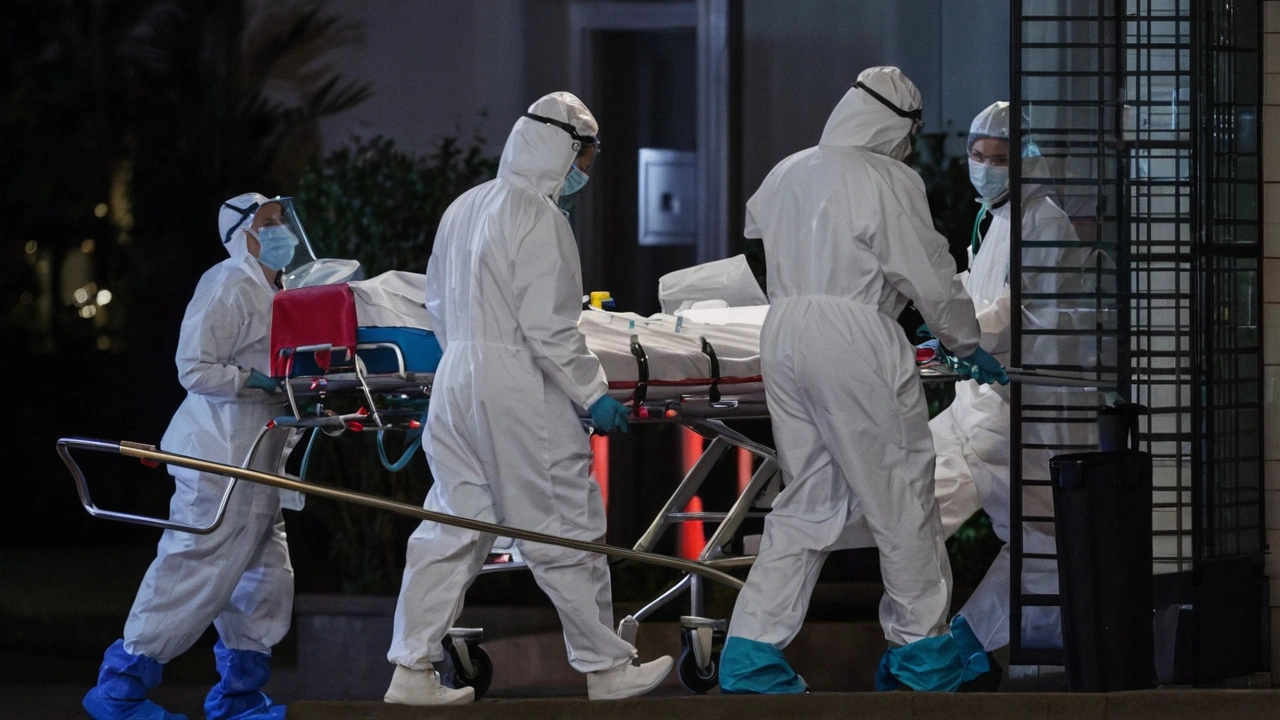Kerala Issues Health Alert Following Death from Nipah Virus
In a concerning health development, the southern Indian state of Kerala has issued an alert after a 14-year-old boy from Malappuram succumbed to the Nipah virus. The state's health minister, Veena George, has confirmed the tragic incident, highlighting the gravity of the situation as the boy's death points to an ongoing threat in the region. In the wake of this event, 60 individuals who were identified as high-risk contacts have been placed under strict observation.
The young boy's infection appears to be linked to the consumption of local fruit in his neighborhood, where fruit bats, known vectors of the zoonotic Nipah virus, are commonly found. This has once again drawn attention to the significant role that wildlife plays in the transmission of certain viruses to humans, leading to outbreaks and severe health crises.
Nipah Virus: A Persistent Threat in Kerala
Kerala has experienced multiple outbreaks of the Nipah virus since it first emerged in the region in 2018, marking the state as a hotspot for this deadly virus. With each outbreak, the state has dealt with fatalities, adding to the global concern surrounding the virus's persistence and the challenges in containing it. The virus, which has a high mortality rate in humans, can cause severe encephalitis and respiratory issues, escalating the urgency of implementing effective control measures.
Immediate Preventive Measures
Following the recent fatality, the state government has swiftly put preventive strategies in place. These measures include advising the public to wear masks in public spaces and avoid visiting hospitals unless absolutely necessary, to reduce the risk of further transmission. The health department is working on disseminating information on how to identify symptoms early and what steps to take in case of suspected infections.
Additionally, local authorities are intensifying their surveillance efforts in affected regions, particularly those known for having a high density of fruit bats. This involves monitoring fruit bat populations and studying their behavioral patterns to understand better how the virus is being transmitted to humans.
Strengthening Health Strategies
In response to the recurring threat of Nipah virus outbreaks, Kerala's state government is formulating a long-term strategic plan to mitigate the virus's impact. This plan includes improving healthcare infrastructure, ensuring that hospitals and clinics are equipped to handle possible outbreaks efficiently, and bolstering the state's capacity for disease surveillance and rapid response. Training programs for healthcare workers on how to manage Nipah cases are also being prioritized to ensure swift and accurate treatment of patients.
Looking to the Future
The state's efforts are part of a broader goal to establish a more resilient healthcare system capable of dealing with emerging infectious diseases. This includes harnessing technology for better tracking and reporting of cases and fostering research to develop potential treatments and vaccines for the Nipah virus. Collaboration with national and international health organizations is also a key component of Kerala's strategy to leverage global expertise and resources in dealing with the virus.
Ultimately, the vigilance and proactive measures taken by Kerala’s authorities reflect an understanding of the gravity of the Nipah virus threat and the necessity of comprehensive strategies to safeguard public health. While the situation remains closely monitored, the commitment to overcoming this health crisis stands as a testament to the state's resolve in ensuring the well-being of its population.
The tragedy of the young boy's death serves as a sobering reminder of the ever-present threat posed by zoonotic diseases and underscores the urgent need for continued vigilance and innovative approaches to prevent future outbreaks.






12 Comments
devika daftardar
July 22, 2024 AT 20:55 PMthis is so sad but not surprising honestly weve been ignoring bat habitats for too long
they dont wanna hurt us we just keep encroaching
its not about blame its about coexistence
fatima almarri
July 24, 2024 AT 19:09 PMthe zoonotic spillover dynamics here are deeply concerning-especially with the anthropogenic pressure on riparian ecosystems in Malappuram. we need One Health frameworks integrated at the grassroots level, not just top-down advisories. the community-based surveillance protocols from 2019 could be scaled if we stop treating this as episodic and start treating it as systemic.
deepika singh
July 24, 2024 AT 21:43 PMok but yall know what’s wild? the fact that Kerala’s response is actually kinda fire? like yeah it’s tragic but they’re not sitting around waiting for WHO to send a drone
they got teams in the field, masks on, apps tracking contacts-this is what public health looks like when you care
we need more states like this 🙌
amar nath
July 25, 2024 AT 16:18 PMfr tho why do we always blame the bats? they been here longer than our villages
we chopped the trees, built near the orchards, then act shocked when nature bites back
its not magic its just ecology
and also-kerala’s got more brainpower per square km than most countries
Pragya Jain
July 26, 2024 AT 14:09 PMthis is why we need to stop letting environmentalists and animal rights fanatics dictate policy. bats are pests. they carry disease. they should be culled or relocated. our children’s lives matter more than some flying rodents. if we had real leadership, we wouldn’t be talking about "coexistence"-we’d be eliminating the threat.
Shruthi S
July 27, 2024 AT 19:47 PMmy heart goes out to the family 😢 i hope they’re getting all the support they need. this is just... too much
Neha Jayaraj Jayaraj
July 29, 2024 AT 14:36 PMokay but did you know the boy’s family ate mangoes from the same tree as the bat droppings?? and the bat? it had a GPS tracker from a 2021 research study?? and the state ignored the warning signs?? this is a conspiracy 😭 conspiracy i tell you 🤯
Disha Thakkar
July 30, 2024 AT 00:41 AMhow quaint. another provincial government performing performative public health while ignoring the real issue: the collapse of urban planning and the commodification of rural land. the bats are merely the symptom. the disease is capitalism wrapped in saffron and sanitizers. also, masks? really? how 2020 of you.
Abhilash Tiwari
July 30, 2024 AT 03:41 AMi live in kerala and honestly? the health workers are legends. they show up in rain, in heat, in the middle of the night. no fanfare. no tweets. just quiet, relentless work. we don’t talk about them enough. they’re the real heroes here.
Anmol Madan
July 30, 2024 AT 04:59 AMhey just wondering-anyone know if the boy’s school is still open? my cousin’s kid goes there and i’m kinda nervous now lol
Shweta Agrawal
August 1, 2024 AT 01:58 AMi think we need more local volunteers to help with awareness campaigns like handing out pamphlets in the villages and talking to elders who still think it’s just a fever
maybe even use local radio stations
we can do this together
raman yadav
August 2, 2024 AT 04:15 AMlet me tell you something nobody else will: this isn’t about bats. this isn’t even about Kerala. this is about the failure of modernity. we think we’ve tamed nature but we’re just borrowing time from the ecosystem. the virus is a message. a cosmic correction. we’ve forgotten that we’re not the apex species-we’re just the loudest ones. and now nature is whispering back. and it’s screaming. you hear it? no? then you’re not listening. you’re just scrolling. you’re just consuming. you’re just waiting for the next headline. wake up. the bats are the prophets. we are the fools.